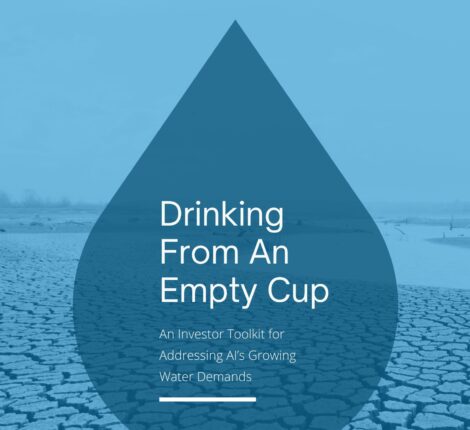One Step Forward? — Our CEO’s Q4 2020 Letter to Clients
One Step Forward?
On January 20th, like many of you, I sat glued to the television. I needed to see Donald Trump walk out of the White House, get into that helicopter, and leave. What he had to say to his loyal followers was of no interest. I just wanted him out. The anxiety leading up to his departure was the culmination of four years of stress and worry, as well as horror at the inevitable insurrection that took place at the Capitol on January 6th. We all knew what this man was made of and there were strong indications that this profound disturbance might take place, but the insurrection attempt on January 6th was still deeply unsettling. I had a loved one attending the inauguration and, even with Trump out of Washington, I remained paralyzed with fear for her safety and the safety of everyone attending the event. Later, as I watched past presidents civilly engage with one another and support the incoming president and vice president, I wept with relief. When Amanda Gorman recited her poem, I wept again and was filled with optimism that all has not been lost.
The symbolism of a Black, Asian American woman as Vice President, let alone Biden as number 46, is profound. For Black Americans it is evidence of the drive, strength, and hard work of a community that has withstood generations of pain and torture. These Americans know that individual trauma and suffering at the hands of their “master” represent the suffering of all and that only by coming together as one, relying on faith, and working collectively to face and conquer evil will we all have better lives. Biden would not be our president without the Black women of Georgia, and he knows it. Selecting Harris as V.P. publicly lifts up the work of those women of Georgia and the work of all of the Black women whose behind the scenes roles have been the foundation of Democracy for decades. Phew.
For 4.5 years my mind has been spinning around wondering how in the hell all of this happened. As the middle class and poor became poorer during a badly managed pandemic, I remain baffled by how it’s possible that 74 million Americans voted to keep Trump in office. Unharnessed global capitalism joined with centuries of racism to activate the mostly-white voters who were unprepared for the wrenching changes of the late 20th century and now the new millennium. Unlike people who have been marginalized for centuries, recently displaced populations (namely, white people who have been accustomed to unearned power and privilege) lacked the resilience and experience to cope. Decades of deregulation, off-loading of retirement responsibilities and healthcare from company balance sheets onto employees, union busting, and growing confusion between freedom and justice for all versus freedom as the pursuit of one’s own happiness, made for anger and resentment that needed to find a target. It must have been a relief when Trump’s presidency gave them the freedom to hate and blame in public. It didn’t help that the Democratic Party, which had once been the party of the people, had by and large bought into the hype of capitalism and the elevation of The Economy (aka corporate power and profits) as the solution to every conceivable problem.
This is in no way a cry for absolution. Rather, it is a plea for all of us to examine our beliefs and experiences with respect to how we think about the crises we face. Is economic growth really the answer to everything? The growth of a consumer economy is dependent on increased consumption, so spreading the myth that we must buy to be happy and free is really about ensuring corporations have sales which lead to profit. When consumerism is challenged (by a pandemic, a housing crisis, changing demand, innovation) corporate profits often decline. When profit margins decrease, companies usually lower wages and benefits or layoff workers. The irony, of course, is that those corporate profits are dependent on mass consumption. Suppressing the wages of rank-and-file workers actually harms consumption, so companies extend credit to compensate for the loss of some consumers, which leads to increasing consumer debt. When consumer debt has been maxed out, consumption is challenged again, wages drop, more people lose their jobs and the cycle continues. The resulting overextension of credit combined with job losses and lower wages leads to unhappiness, stress, and desperation among already marginalized groups of people, communities of color and the working poor. Relying on low wage workers and the underemployed to continue to consume goods (or pay off debt) does not work. Economic growth without regard for the human toll is wrong, and the perpetuation of the myth that consumption equals success or happiness must end. If this approach to profit continues, very few consumers will remain, and our consumer economy will, of course, fail. Fair wages and support for workers throughout their lives (health insurance, retirement benefits, vacations), though costly to corporations, will lead to an economy that has a better chance of working for everyone. A new conversation about what it means to be a nation of all people, and what it means for the wealthy to work alongside the poor toward the well-being of all, is essential if we are to right this economy, this democracy, and all of the people in it. The inextricable link between racism and capitalism must be broken if we are to survive as a nation.
2021
As of this writing, the new administration has introduced numerous executive orders aimed at beating back the damage inflicted by the former administration. Many of these orders are likely to be symbolic, given the necessity of Congressional approval. Nevertheless, they are a welcome relief.
I have heard people compare the swift action that Biden has taken to the slower, cautious approach that was evident during the first six or seven years of the Obama administration. There is an implicit criticism of Obama baked into this observation. Joe Biden may not come from economic privilege, what with being from Scranton and all, but his privilege as a white guy with a long history in politics has given him a significant leg up, allowing him the imbedded confidence to right wrongs beginning on day one. The risk of rejection and the bar of acceptance are massively lower than the bar that Obama faced. Comparing Biden to Obama because he has immediately addressed climate, economic inequality, labor unions, and even LGBTQ rights is not a fair comparison. Biden is a white guy who understands his privilege and is using his power to steer us toward what I hope will become a healthy democracy with healthy people and a vibrant economy, a goal that progressives and non-Trump Republicans can likely get behind. I’m hopeful that Biden’s actions will come to fruition, but not at the expense of diminishing Obama’s lasting legacy.
For years, Presidents have been promising improvements to our crumbling infrastructure. While Biden moves to beat down the Keystone Pipeline and stop drilling in the Arctic Refuge and on public lands, he has also indicated an interest in sustainable energy and electric vehicles. I don’t know if Biden has ever had an electric car, but he needs to know that charging stations across the U.S. are in short supply. Also, renewable energy sources must be enhanced so that the electricity powering the electric vehicles is cleaner than it currently is. This requires huge infrastructure work along with coordination and collaboration among the many often-competing players. Will he be able to pull it off? Let’s not forget that he has not declared fracking hazardous…
This past week there was a lot of excitement about GameStop, a company which I want to discuss, but that we do not hold on our buy list. The crux of the matter is that some Wall Street hedge fund types felt that the company was a mess (it is) and so attempted to profit from the poor outlook for the company. They borrowed shares of the stock from those who owned the stock and then sold the stock “short,” meaning that they sold it even though they didn’t own it. The idea was that, when the stock price dropped, they would buy it at the lower price and return the borrowed shares to the owners. The difference between the price of the stock when they sold the borrowed shares, say $25 per share, and the price they thought they would be able to pay once it went down, say $10 per share, would be their profit – $15 per share in this example.
Well, things didn’t go as planned. Rather than the stock dropping, it rose dramatically. It rose so much because an online community of people decided they were sick of hedge fund guys manipulating the market, so they decided to buy the stock en masse and to keep buying it until the stock rose so substantially that the hedge fund guys would have a tremendous loss. Instead of the stock sticking to its projected price or even dropping back down to its annual low of under $4, the price rose to $483 per share by late January. This meant a significant loss for hedge funds guys. As of this writing, the hedge funds have lost about $20 billion.[1]
The quick organization of this strategy among the buyers happened over the internet, and several NorthStar clients found this to be quite disconcerting. It is now being called a “populist” strategy – an organization of buyers to prove a point and to save GameStop shareholders from “bad actors.” When thinking about this tactic, there are three problems that immediately come to mind:
Problem 1: Is it right to sell shares of a company, driving the shares lower, to make a profit?
Problem 2: Is it right to buy shares of a worthless company and to encourage others to do the same in order to make a point and intentionally cause harm?
Problem 3: Is this behavior why stock prices are so high during a recessionary pandemic?
Well, here we go with capitalism again. Problem 1 is legal, and Problem 2 may be, too. Neither activity is particularly ethical in our minds. As to Problem 3, it is probably not related to Problems 1 and 2, but it could be. That said, we want to be sure we’re clear about our practices. At NorthStar, our research team spends a great deal of time understanding the underlying value of a company. We examine earnings, profit, outlook, and governance all within the context of the industry that the company is in and given the current economic environment. We then decide whether we will buy the stock. While the general idea is that a company’s stock price should not be too high relative to earnings or future growth, the price of the stock is variable, as we all know. If 20 investment firms have positive outlooks on an investment in a public equity, they might recommend a buy, and the stock would likely rise on that recommendation. Conversely, if those same firms lose faith in the prospects of the company, they might issue a sell recommendation, which might cause the stock to go down. Hedge funds took their evaluation of GameStop one step further. They felt strongly that the company was not going to survive, so they sold short. Sadly, this is entirely legal.
Short selling happens all the time. We don’t do it, but lots of firms do. The activity of organizing a bunch of people to buy the stock of a company that is facing bankruptcy could be illegal because the person or persons organizing the activity are giving others financial advice without any knowledge of the risk tolerance or financial situation of the investors, and, further, they are manipulating the market. It is not a great way to make decisions and can certainly cause harm. But in this case, it could be deemed legal because investors have agency over their own purchases. The legality of all of this is not ours to determine, but we know we wouldn’t participate in something like this.
The GameStop publicity comes at a time when everyone is wondering how in the world the stock market could keep going up in the middle of a pandemic. The fear is that all stocks are high because people have been madly buying stock. People with money have been madly buying stock, interest rates are at an all-time low. But what is really important to think about are the dramatic changes in the way we live our lives and what that will mean for the economy moving forward. Demand for certain technology has skyrocketed, and the way we depend on office space, in person meetings, travel, leisure and even financial transactions has been dramatically affected. While we believe that there will be some movement back to the way things were pre-pandemic, we suspect this change in behavior will continue for some time. We believe there are plenty of companies to invest in that will reflect this new normal without having to resort to gambling with the hedge fund guys to achieve capital appreciation. Should Biden successfully pass pandemic aid and an infrastructure plan, we may see a resurgence in jobs related to building out that infrastructure, but there is a ways to go before such a plan turns into money in workers’ pockets. This recovery will be a long one, I suspect, even with quick action on the part of the President. The pandemic feels like it might never go away, and the real recovery in all sectors will still bring us back to a country with growing inequality. The distribution of consumer goods may have changed forever, and the excitement about consumer goods related to fashion may be replaced by home improvements and personal care. The need for time away will resurge, as will dinners out at the remaining establishments, and leisure travel. Will online communication continue to challenge and disrupt our sense of right and wrong, good and evil, and tolerance for one another? That is hard to predict. We remain in a dark period with isolation contributing to paranoia, depression, and anger for many. We have never been here before, with “free speech” interpreted as the right to say anything to anyone at any time. Once we have conquered the physical illnesses in this country, perhaps we can focus on the mental illnesses enhanced by the economic decisions of our leaders, rampant focus on individualism, and the root causes of this pain. Rebuilding communities out of openness and caring and not hatred and isolation will get us far closer to the recovery that we need.
— Excerpted from NorthStar’s fourth quarter 2020 letter to clients
The forecasts, opinions, and estimates expressed in this report constitute our judgment as of the date of this letter and are subject to change without notice based on market, economic, and other conditions. The assumptions underlying these forecasts concern future events over which we have no control, and may turn out to be materially different from actual experience. All data contained in this letter is from sources deemed to be reliable, but cannot be guaranteed as to accuracy or completeness. All investments are subject to risk, including loss of principal. Past performance is no guarantee of future results. It is not possible to invest directly in an index.
FOR INFORMATION PURPOSES ONLY
This information includes a discussion of a number of companies and other financial market and social events. These opinions are current as of the date of this publication but are subject to change. The information provided herein does not provide information reasonably sufficient upon which to base an investment decision and should not be considered a recommendation to purchase or sell any particular security.
_________________________________________________________________________
Footnote:




